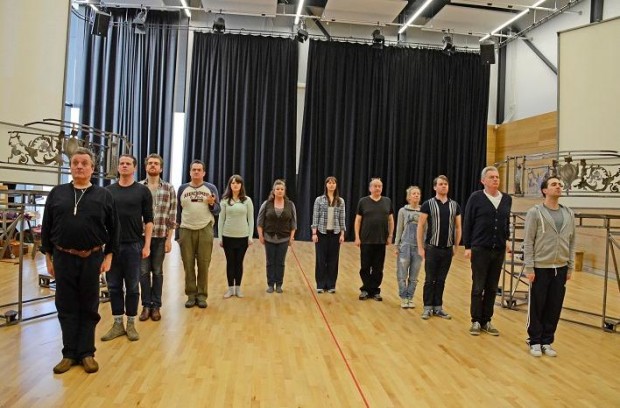You have no items in your cart. Want to get some nice things?
Go shopping
What do Sizwe Banzi Is Dead, a play about two black men struggling with notions of identity in apartheid-era South Africa, and Oh What A Lovely War, a musical taking a vaudeville approach to the First World War, have in common? Both plays were revived this week, at the Young Vic and the Theatre Royal Stratford East respectively, and though the originals were created ten years apart (1972 and 1963) and deal with very different contexts, they are both similar in their status as theatrical texts. We might chiefly associate the names Athol Fugard and Joan Littlewood with each piece, but they were both created by a collection of artists. To this end, how “faithful” can any subsequent production be? Why should revival casts follow the exact wording of the text when the original creators had freedom to play?
The births of both pieces are well documented. For Oh What A Lovely War, Littlewood worked with members of her Theatre Workshop ensemble to develop a show which was part music hall, part epic, and encouraged actors to improvise scenes, meaning that the script would constantly change in rehearsals. Similarly, Athol Fugard wrote Sizwe Banzi Is Dead with the two performers, John Kani and Winston Ntshona, meaning that the text and its characters were able to be highly personalised. In both cases, the productions morphed and shifted over time, so that the versions of each which ended up on Broadway – with unchanged casts and creative teams – were very different to the premieres.
In this light, is it right that the new revivals of these shows should stick so defiantly to the published texts? Though Matthew Xia’s production of Fugard’s play and Terry Johnson’s take on Littlewood’s may make the odd change here and there, they could undoubtedly play around more with the written text. In the rehearsal rooms, the original casts would, inevitably, have responded to contemporary events and personal stories, creating shows which had great resonance for both those involved and their audiences. Though it’s understandable that the publishers of both texts want to keep the plays intact and the directors want to “do the play justice”, we must question what the implication is of such dogmatic adherence to the written text, especially with plays which were created not by one author but by a group of theatre-makers.
In both of these cases, the “play” is not as clear-cut as elsewhere, as it’s difficult to tell where the text begins and the original production ends. Whereas in other plays we have a singular voice, plays like this see a number of “authors” jostling for attention. Why, then, do subsequent revivals have to follow the text word-for-word for “copyright reasons”? Directors are allowed to play around with staging and setting, so it seems absurd that they can’t make the odd change to the spoken word too. A revival of one of these plays which allowed actors and creatives to chip in with their own thoughts would surely be even richer than before.
On the other hand, there is no theatre which is not devised, at least to some extent, as playwrights will almost invariably make some kind of edits during a rehearsal process. Tom Stoppard may do much of his writing in his study, but do we really believe that he doesn’t tinker with a line here and there when he’s heard the actor get tongue-tied a couple of times? We understand that Shakespeare was a genius, but it’s impossible to imagine that he wouldn’t have taken the odd pointer from his long-term collaborator, Richard Burbage. And the team behind Jerusalem have gone on record as saying that it was a collaboration between Jez Butterworth, Ian Rickson and Mark Rylance.
It should be noted that none of this is meant as a criticism of either production, but we should think more about our relationship to text and the shift in emphasis from process to product. For these two shows and many others, the way they were created was almost, if not as important as the final production; the process of creation itself says something about the subject of the drama. It’s a dichotomy which is evident in another show which has opened this week – Secret Theatre Show Four at the Lyric Hammersmith. This is a company which blurs the boundaries between written and performed text, and who attempt to add layers of creativity to an already existing play. What companies like Secret Theatre recognise is that theatre exists in the contemporary moment and that, if we insist on viewing it as an infallible, unchangeable product of the past, there’s no way we can move forward.
Oh What A Lovely War runs at Theatre Royal Stratford East until March 15; Sizwe Banzi Is Dead runs at the Young Vic until the same date.

About Dan Hutton
Dan is a freelance critic and theatre-maker. He won the Howard Hobson Award for Theatre Criticism at NSDF in 2010, 2011 and 2013, and in 2013 was the runner-up for the Edinburgh Fringe Allen Wright Award for Arts Journalism. Dan is also a director and co-runs Barrel Organ Theatre.




